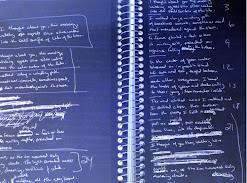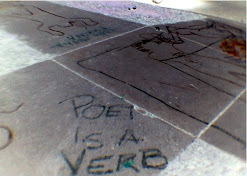After the debate on autobiographical truth in poetry in the comment section of my last post, I decided to do a little research. In graduate school, we debated the difference between the use of the "lyric I" and the "lyric eye." Both use the first person narrative in poetry, but they use it in two completely different ways.
For me, the lyric I entails the use of the I in an autobiographical, almost confessional sense. I think of the way I teach the poem "Daddy" by Sylvia Plath, when I think of the lyric I. In our literature book, there is a quote by Plath stating that the poem is about a girl who had an Electra complex and learned that her father was a Nazi, which complicated matters. Beneath that, the editors provide a brief biographical background on Plath's family. Otto Plath, her father, was never a Nazi, though he was German.
For me, the lyric I entails the use of the I in an autobiographical, almost confessional sense. I think of the way I teach the poem "Daddy" by Sylvia Plath, when I think of the lyric I. In our literature book, there is a quote by Plath stating that the poem is about a girl who had an Electra complex and learned that her father was a Nazi, which complicated matters. Beneath that, the editors provide a brief biographical background on Plath's family. Otto Plath, her father, was never a Nazi, though he was German.
When I teach this poem, I always tell my students to discount what Plath says about the poem herself. From what we know about Plath's life and artistic intentions, this poem is rooted in a lot of truth. She did have Daddy issues. This is one of the last poems that she wrote in her life and she was grappling with her adoration of Fascist men. ("Everyone woman adores a Fascist/ The boot in the face, the brute/Brute heart of a Brute like you.") So, I'm a hypocrite when I teach. I say my poetry isn't necessarily true, but this one definitely is. But I believe that I base my criticism in good research.
Then, there's the lyric eye. For me, this encapsulates the use of I in a pseudo-biographical sense or a completely fictional sense. For instance, the work of Ai or Patricia Smith. Both of these women use the persona and multiple persona in their books to illuminate an experience for the reader that they have never had. They capture the scariness in the daily world, the horror and the terror. (Dogfaceboy, for her Poetry Thursday offering, entitled "Enough" does this really well, too.) While it is pretty clear that the I in these poems is not the author, they are using the I to create true experience, in an emotional sense.
Then, of course, there is the blurry lines between all of this. As readers and writers, we have to decide where we fall on this sticky subject. Many, and most, believe that playing with journalistic truth is the right and the duty of poets. Not everyone believes that, however. Ted Kooser, our poet laureate, writes about this issue:
"Perhaps I am hopelessly old-fashioned. Perhaps I should accept
the possibility that what the poet says happened really didn't
happen at all, but I'm going to have to make a painful adjustment
in the way I read poetry and honor poets. I grew up believing
a lyric poet was a person who wrote down his or her observations,
taken from life. I have always trusted the "I" of Walt Whitman as
he dresses the wounds of fallen soldiers; I trust Mary Oliver to tell
me what birds she saw as she walked through a marsh; I trust
Stanley Kunitz when he describes two snakes entwined in a tree."
-- Taken from this article.
While I often use the lyric I and the lyric eye interchangeably in my work, but I have to acknowledge the truth in Kooser's statements. I do believe, deep down, in the I as author perspective in poetry, due to its rich history in our literature.
Then, there's the lyric eye. For me, this encapsulates the use of I in a pseudo-biographical sense or a completely fictional sense. For instance, the work of Ai or Patricia Smith. Both of these women use the persona and multiple persona in their books to illuminate an experience for the reader that they have never had. They capture the scariness in the daily world, the horror and the terror. (Dogfaceboy, for her Poetry Thursday offering, entitled "Enough" does this really well, too.) While it is pretty clear that the I in these poems is not the author, they are using the I to create true experience, in an emotional sense.
Then, of course, there is the blurry lines between all of this. As readers and writers, we have to decide where we fall on this sticky subject. Many, and most, believe that playing with journalistic truth is the right and the duty of poets. Not everyone believes that, however. Ted Kooser, our poet laureate, writes about this issue:
"Perhaps I am hopelessly old-fashioned. Perhaps I should accept
the possibility that what the poet says happened really didn't
happen at all, but I'm going to have to make a painful adjustment
in the way I read poetry and honor poets. I grew up believing
a lyric poet was a person who wrote down his or her observations,
taken from life. I have always trusted the "I" of Walt Whitman as
he dresses the wounds of fallen soldiers; I trust Mary Oliver to tell
me what birds she saw as she walked through a marsh; I trust
Stanley Kunitz when he describes two snakes entwined in a tree."
-- Taken from this article.
While I often use the lyric I and the lyric eye interchangeably in my work, but I have to acknowledge the truth in Kooser's statements. I do believe, deep down, in the I as author perspective in poetry, due to its rich history in our literature.




0 Comments:
Post a Comment